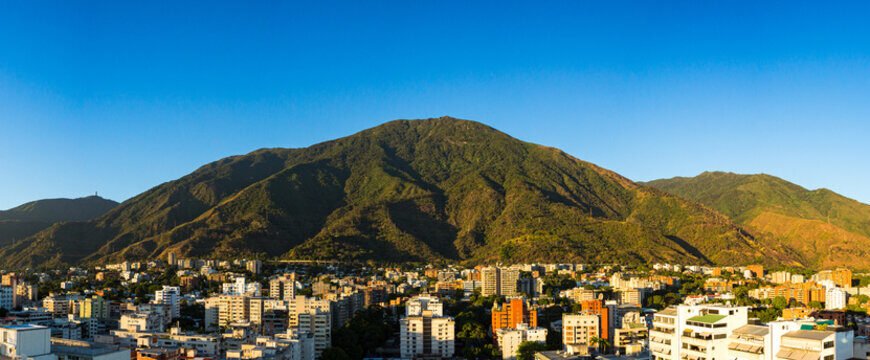Caracas, the political, administrative, commercial and financial capital of the Bolivarian Republic of Venezuela, is today one of the most modern cities in Latin America, with an intense commercial, cultural, academic and social life.
Caracas was founded on July 25, 1567 by Diego de Losada, who baptized it, in the name of the Spanish colonial power, with the name Santiago de León de Caracas. It is located on the slopes of Avila, the imposing mountain 2,750 mts. high that flanks the Caracas Valley to the north, whose original inhabitants called Waraira Repano (Sierra Grande, in the language of the Toromaimas indigenous people), an autochthonous name that has regained relevance during the governments of President Hugo Chávez Frías and President Nicolás Maduro Moros.
According to the most careful researchers of the history of Caracas over the centuries, the Toromaimas tribe originally resided in the valley crossed by the Guaire River, while the Mariches inhabited the area of Petare, at the eastern end of the valley. Likewise, there is a belief that when the Spanish came into contact with these tribes, they saw some aboriginal women preparing a type of stew with herbs unknown to them. When asking the men what those herbs were, one of them took a handful of the herb and began to exclaim “Cara-cara, caracas!” The name of the capital of Venezuela is supposedly derived from the name of the herb, even today a very common wild plant species in the Caracas area, which is currently known as Pira and is very nutritious as food and has medicinal properties.
In 1576, the first Governor of the Province of Venezuela, also called the Province of Caracas, established himself in Caracas. The area of the province expanded progressively as a result of the expansion of the initial settlements. In 1777, the Captaincy General of Venezuela was created, with jurisdiction over the Provinces of Cumaná, Guayana, Maracaibo, Margarita and Trinidad (then a Spanish colony). Caracas was the capital of the Department of Venezuela until 1830 and after the separation of Gran Colombia it became the capital of the Republic of Venezuela.
The valley where the city of Caracas is situated has a section of the Coastal mountain range as a natural barrier that prevents the influence of the climatic factors of the Central Coast, close to the capital. This, combined with a height of 950 meters above sea level, allows it to have a mild climate throughout the year. The city of Caracas has a rainy tropical climate characterized by medium and high temperatures, with an average above 18°C in the coldest month of the year. The average annual temperature of the Caracas valley is 22°C.
It is estimated that by 2023 the metropolitan area of Caracas will have a population of around 6.5 million inhabitants; a hospitable and friendly town that has been nourished by the culture, traditions and gastronomy of the numerous immigration flow from countries such as Italy, Portugal, Spain, Colombia, Lebanon and Syria, among others.
The city of Caracas and its surrounding area has tourist and historical attractions worth a visit, among which are the central part of the city, which includes Plaza Bolívar; Cathedral; the National Assembly (Parliament); the Birthplace of the Liberator Simón Bolívar; the National Pantheon, which keeps the mortal remains of the Father of the Nation and other heroes; and the Cuartel de la Montaña, eternal resting place of Commander Hugo Chávez.
Beyond, other sites of interest await the visitor, such as the cable car that goes up to the top of the Avila Mountain (Waraira Repano), where the imposing Humboldt hotel is located; the national museums area (which includes the National Art Gallery and the Museums of Fine Arts, Natural Sciences and Contemporary Art); the Teresa Carreño Theater; the Center of Social Action for Music (home of the world renowned System of Children and Youth Orchestras and Choirs of Venezuela); the Central University of Venezuela (declared Cultural Heritage of Humanity by UNESCO); Altamira’s Plaza Francia; and the town of El Hatillo, among many others.
The possibilities for shopping are endless, with the city of Caracas having numerous shopping centers; as well as a very diverse gastronomic offer, especially in restaurants located in certain areas of the city such as La Candelaria, Chacao, Las Mercedes, La Castellana and Altamira.

